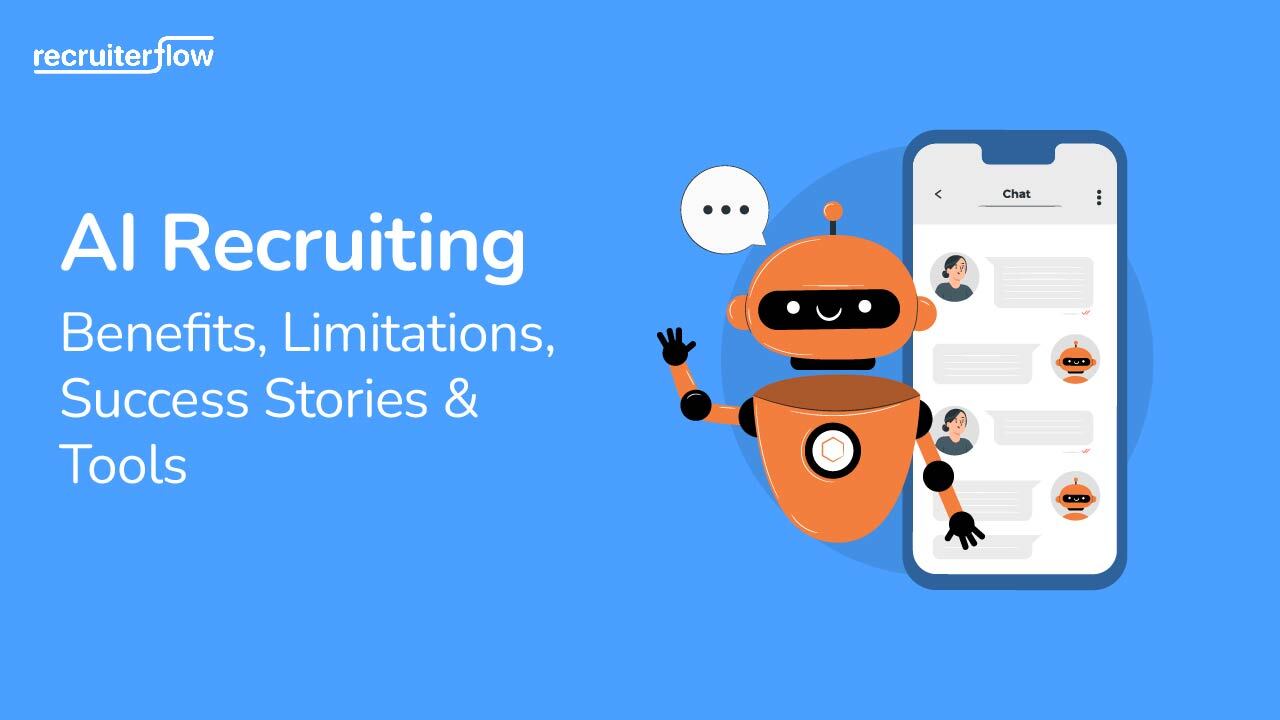
AI Recruiting in 2025: The Complete Guide
AI recruiting has transformed the traditional recruitment approach. Over a third of hiring leaders have embraced AI in recruitment, and 40% are invested in upskilling their talent force by integrating AI into their systems.
AI empowers recruitment agencies to address their clients’ recruiting needs effectively – from expediting candidate sourcing to refining the candidate experience.
In this article, we’ll explore the opportunities, challenges, and best practices associated with AI recruiting and the best AI recruitment tools that enable fast and smart hiring.
What is AI in recruiting?
AI in recruiting refers to applying artificial intelligence to optimize and automate various hiring processes and make better decisions. AI evaluates and processes a large amount of data from the recruitment market and uses that to identify patterns, trends, and insights and augment human-like thinking capabilities.
Will AI replace recruiters in 2025 or beyond?
No, AI will not replace recruiters. If anything, it’ll make their job easier!
However, AI will reduce many repetitive tasks. As AI is quick at optimizing complex problems after spanning numerous data sources and decision points, it’s now on to recruiters to level up and adopt AI into their day-to-day tasks.
While AI will extract the data, recruiters will still need to use their cognitive abilities to review that data, derive results, assess opportunities, and develop strategies.
Recruiting AI vs recruitment automation: Are they the same?
About 52% of companies define AI as automation, but they’re not the same!
AI responds to data and continually improves its ability to perform tasks by replicating human-like intelligence. On the other hand, automation lacks the learning and decision-making capabilities of AI.
Automation automates mundane and repetitive recruitment tasks such as reaching out to candidates, scheduling interviews, streamlining candidate communication, collecting, sorting, and managing job applications, and more.
AI takes recruitment automation to the next level by enhancing its functionality.
AI-powered sourcing tools actively scan online job boards, professional networks, and social media platforms to identify and engage passive candidates who meet precise job criteria. They analyze candidates’ online profiles, evaluate their skills and experience, and rank the top candidates for closer review.
What are the benefits of using AI in recruitment?
30% reduction in time to source
With AI recruiting, you can secure top talent before your competition does!
Recruiters can significantly reduce the time spent on sourcing by around 30% with AI. This means you can identify and engage with potential candidates faster than ever before.
Support diversity
AI is changing how companies think about diversity recruiting and inclusion. With features like screen readers, voice commands, and captioning, it’s easier for candidates with disabilities to apply for jobs. Plus, AI helps find talented people in new places, so companies can build diverse teams.
Better candidate experience
You might wonder—how can less human interaction lead to a better experience for candidates?
Many AI tools in recruiting are specifically designed to fast-track the hiring process. When job seekers can quickly and easily find the information they need, they’re more likely to engage with your organization.
For example, chatbots streamline the interview process, eliminating back-and-forth emails. You can enable the chatbot to ask structured questions, evaluate responses in real-time, and provide instant feedback to candidates.
Improve hiring metrics
Performance metrics in recruitment typically fall into two main categories: quantitative and qualitative. Quantitative metrics focus on measurable outcomes, such as time-to-hire and conversion rates, while qualitative metrics assess factors like candidate experience and quality-of-hire.
Recruitment automation tools and AI-powered solutions streamline the end-to-end hiring process, reducing manual tasks and improving efficiency. This leads to faster “time-to-hire” and higher conversion rates, as recruiters can quickly identify and engage top talent.
They also enhance the candidate experience by reducing friction and simplifying the application process. This not only keeps top talent engaged but also enhances the employer brand, making it more appealing to prospective candidates. This leads to an improved “quality-of-hire” metric.
You can also watch our YouTube video to learn more about how recruiting can benefit your recruiting business.
Challenges of AI for recruiting teams
AI’s benefits in recruitment are multifold, it has some limitations too! Here are some challenges recruiters face or have faced in the past with AI.
Biasing
AI algorithms can pick up biases from the data they are trained on. If historical data contains biases related to gender, race, or other factors, AI might log these biases into its algorithm, leading to unfair hiring practices. Over 60% of Americans fear bias and potential discrimination in AI-assisted hiring processes, signaling strong public support for AI regulation and guidelines to ensure equitable AI practices.
For example, back in 2018, Amazon’s recruitment AI started favoring men over women. That’s because Amazon’s computer models were trained to assess job applicants based on patterns observed in resumes submitted to the company over a decade.
Since most resumes came from male candidates due to the tech sector’s male dominance, the system naturally learned to favor male candidates.
Also, read our blog on recruitment marketing to discover strategies that help you attract and engage top talent effectively.
Fear of becoming obsolete
As AI continues to automate and streamline various aspects of recruitment, there’s a legitimate concern among recruiters about AI replacing them.
While 96% of recruiters believe AI can help them in their current jobs, 60% are afraid it will eventually kick them out of work.
Ethical dilemma
Concerns around the fairness, accountability, and transparency of AI’s decision-making processes make it difficult for some recruiters to get on with it.
AI isn’t transparent about how certain decisions are made. Without clear explanations, individuals may feel unfairly treated or discriminated against, losing trust in the recruitment process and the organizations using AI recruitment technology.
Also, read our blog on sourcing vs recruitment
Responsible use of AI in recruitment
As AI continues to evolve and revolutionize the recruiting industry, concerns around the ethical implications of AI adoption in recruitment have taken center stage.
The government of the UK has released guidance on the responsible use of AI, offering insights to mitigate bias and discrimination risks for candidates lacking digital skills.
It advises organizations to carefully assess several factors before adopting an AI system, including:
- Identifying the specific challenges they aim to address with AI
- Communicating transparently about AI usage to prospective job applicants
- Evaluating the capabilities of AI systems available in the market
- Determining if employees require training or additional support to use the technology
Best AI recruiting software for recruiting agencies
1. Recruiterflow
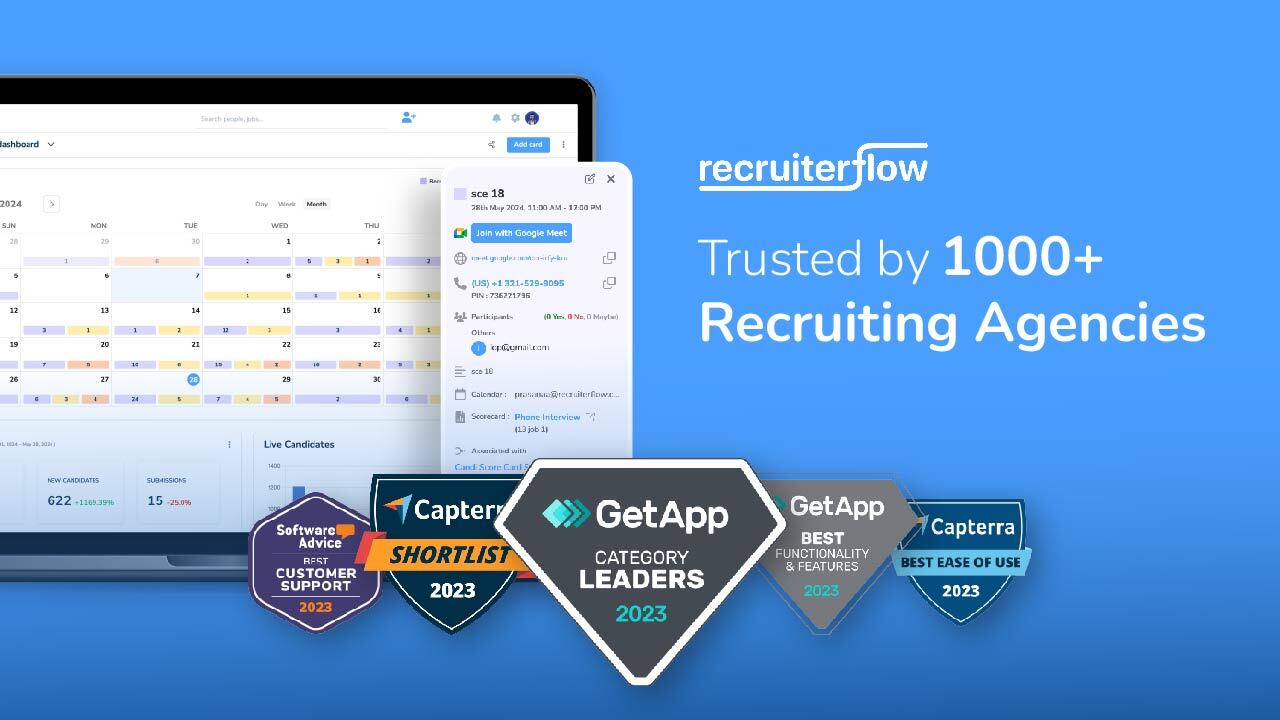
Recruiterflow is an all-in-one solution for staffing and executive search firms with a cutting-edge Applicant Tracking System (ATS) and CRM platform. It facilitates the effective tracking of candidate data, offering insights into the candidate pipeline and managing candidates through an activity log.
- It comes with an inbuilt email sequencing tool that helps users engage with potential candidates through personalized email sequences.
- The resume formatting feature helps you create submittal-ready resumes and hide sensitive information on the resume.
Price: Starts from $99/month per user
Recruiterflow’s ATS & CRM is Rated 4.8/5 on Capterra.

2. Smart sourcing by Indeed
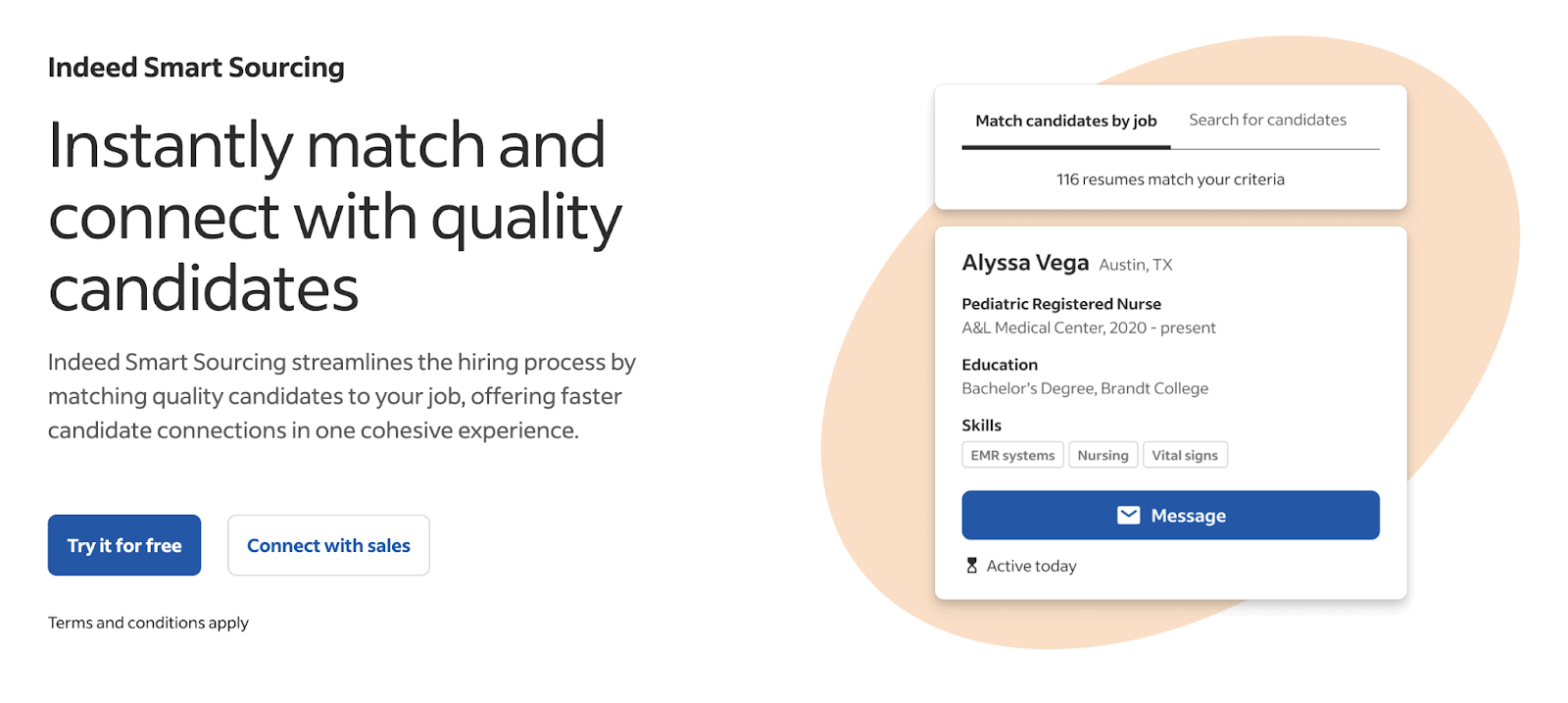
Indeed’s recently introduced smart sourcing tool uses advanced matching technology and AI to help expedite the talent-sourcing process, without losing personal touch. Now, you don’t have to manually filter through resumes—the algorithm will match active candidates to your open roles.
Moreover, you get features like:
- AI-powered messaging to generate a customized message based on the content of the candidate’s resume and your job posting.
- Collaborative task management to invite collaborators to sourcing projects and accelerate the candidate feedback process.
Price: Custom
Also, read our listicle on the best recruiting automation software
3. Betterleap
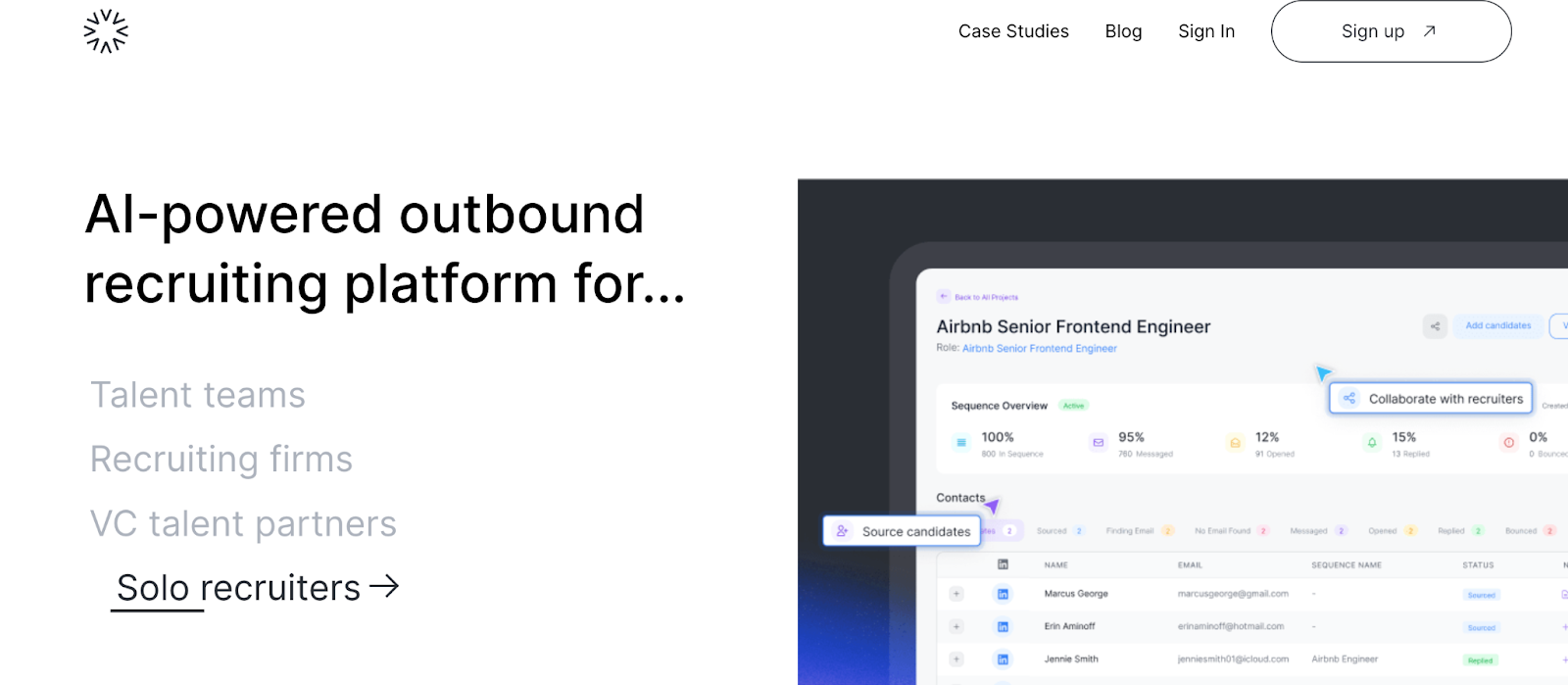
Betterleap is an AI-powered outbound recruiting platform that helps recruiters source candidates and reach out to them effectively. You can even collaborate with recruiters outside of your organization all from one platform.
- The Chrome extension allows you to source candidates with one click.
- You can create multi-step mail sequences using GenAI.
- All candidate communication is centralized, so you can speed up the feedback loop.
Price: Custom
4. Interviewer.AI
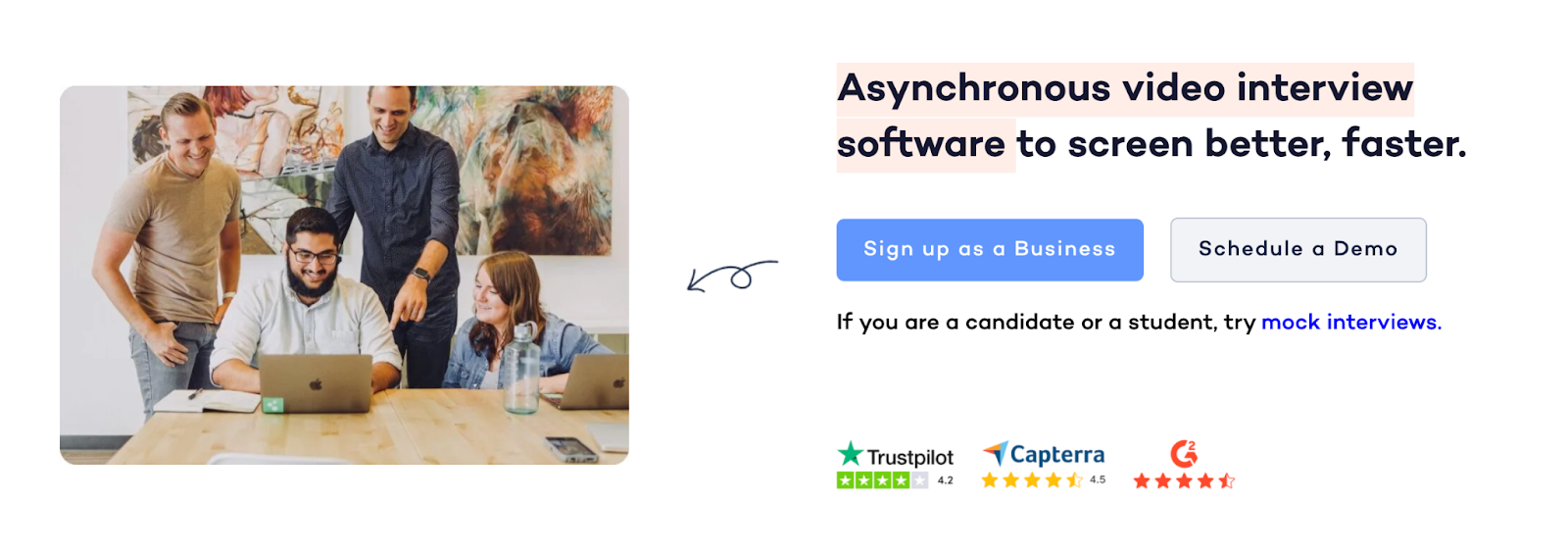
Interviewer.AI is an asynchronous video interview platform that uses Explainable AI to pre-screen and shortlist candidates. The software analyzes the key factors of potential candidates, including psychological and technical aspects, giving you more time to focus on critical tasks.
Price: Custom
You can also read our guide on AI screening and its benefits to learn how AI is transforming recruiting.
5. Test Gorilla
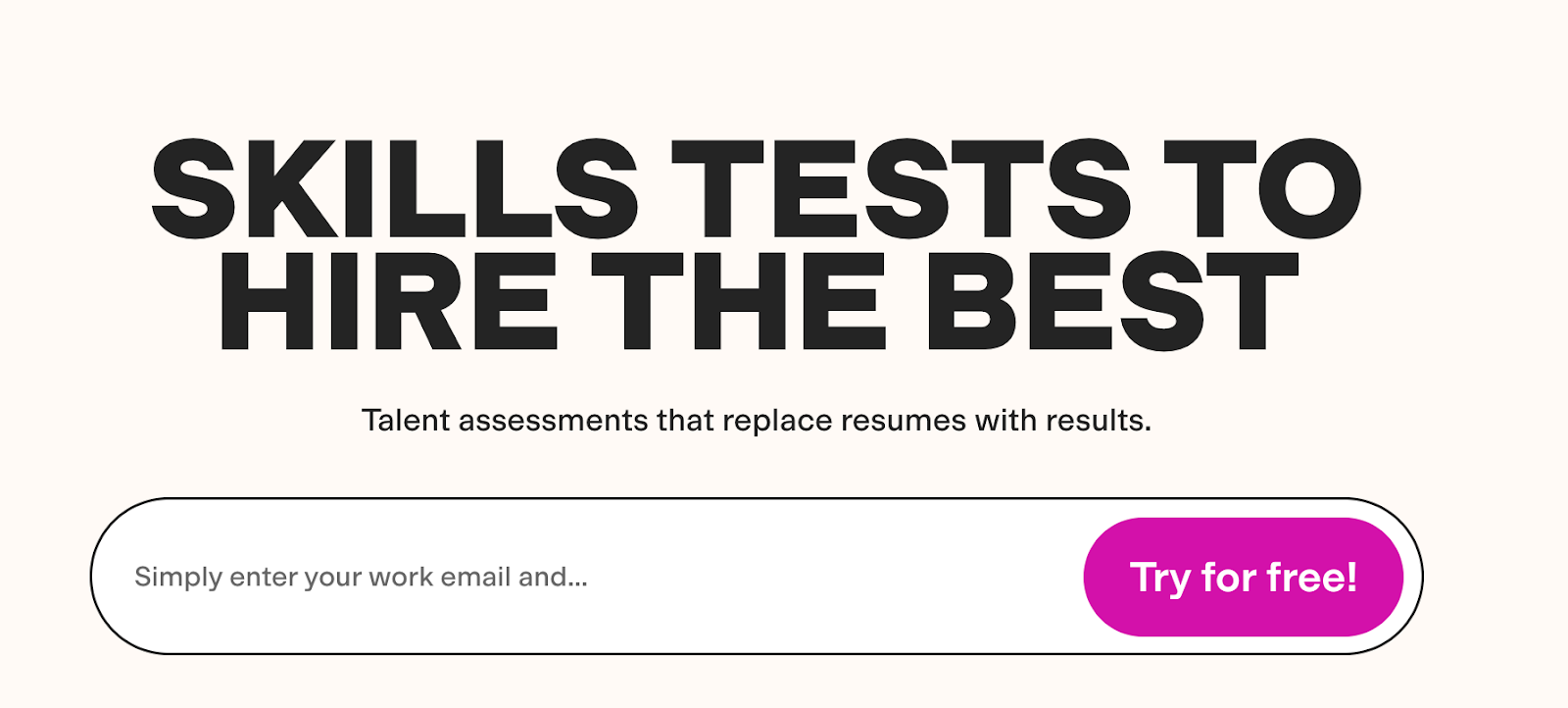
Test Gorilla is a pre-employment test platform that’s designed to replace resumes in hiring. Their talent assessment library helps you dig deeper into evaluating candidates skills, behavior, and culture.
- You can create high-quality assessments from their vast library of tests and your custom questions to the mix
- You can connect with candidates straight from your ATS software and send multiple invites with a single click.
Price: Starts at $499 per month
Latest statistics related to AI recruiting
GenAI in recruiting
About 27 of the surveyed talent professionals have been exploring GenAI in their day-to-day recruiting tasks. Additionally, there’s a 14% increase in recruiters adding AI skills to their LinkedIn profiles in 2023.
You can also check our blog for the latest recruiting statistics.
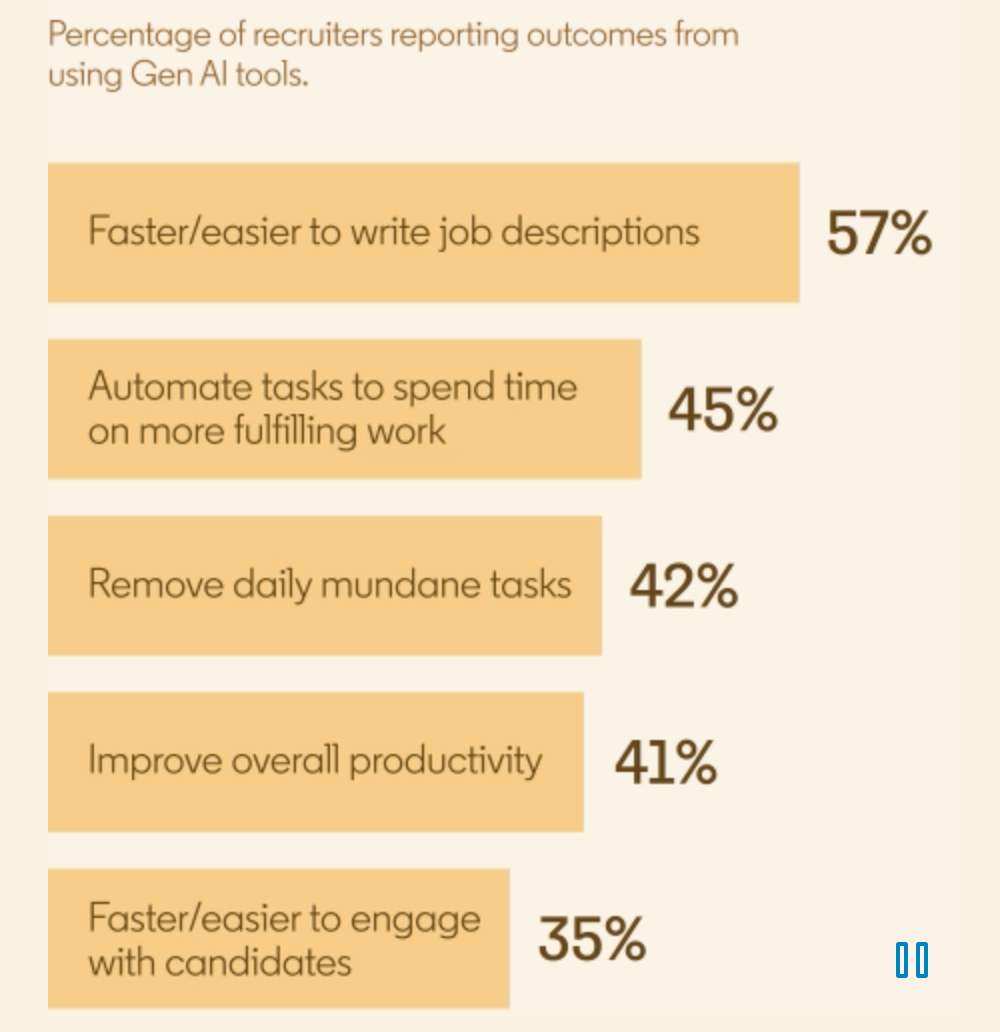
AI for candidates
Candidates use AI to simplify tasks such as customizing resumes, drafting cover letters, and searching for job opportunities. Candidates using AI to enhance their resumes and job applications saw 8% higher hiring rates.
Use of AI in recruitment
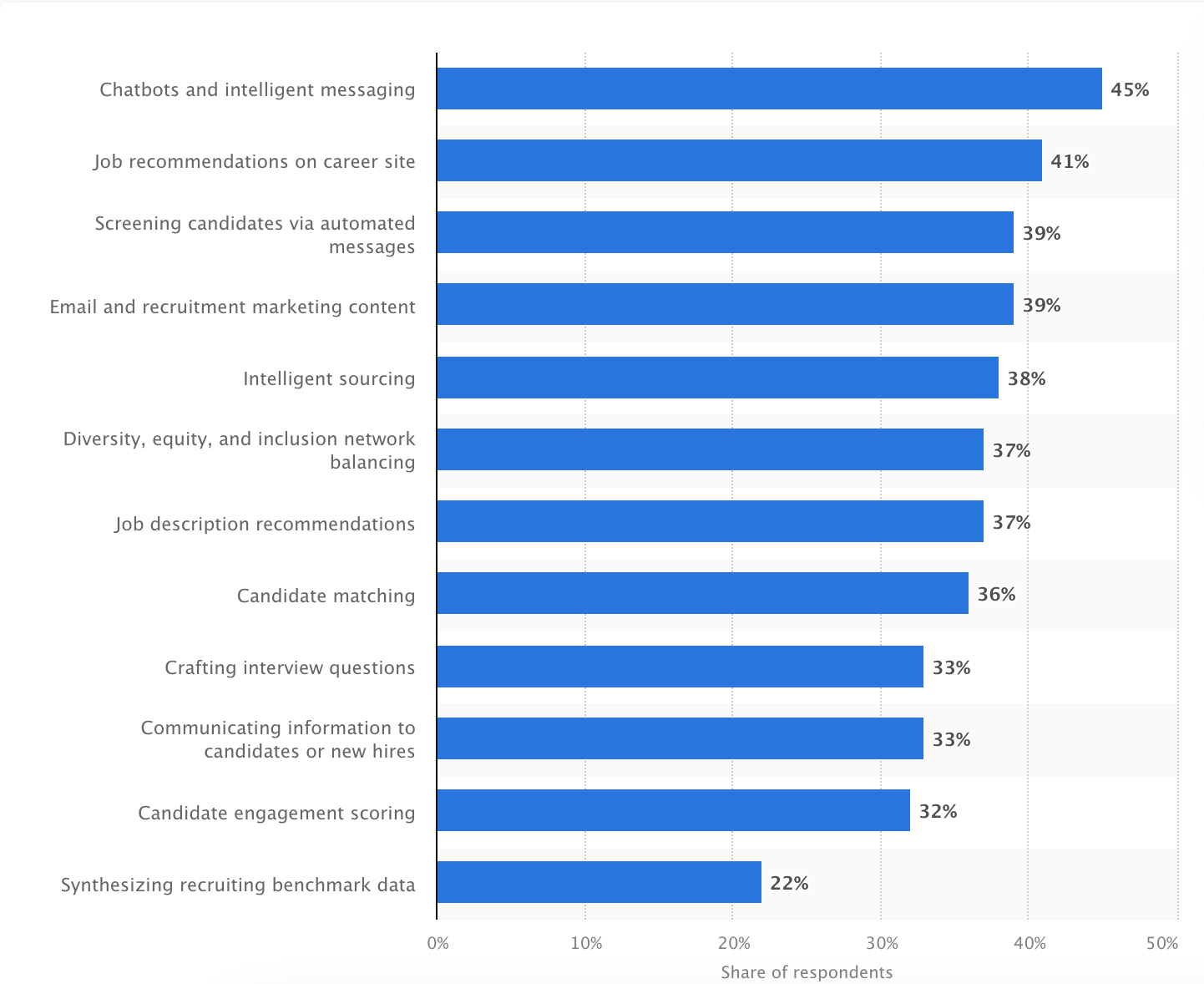
Chatbots and intelligent messaging were the most used AI recruiting tools in 2023 across North America. Also, about 41% of respondents from the survey heavily used AI for job recommendations on career sites. With the rise of databases like RAG and Vector, these chatbots and intelligent messaging tools can now access and process information effectively, leading to more relevant and personalized job recommendations.
Opinions on AI recruiting
- 85% of recruiters think AI is useful
- 79% of recruiters believe AI will soon be competent enough to make hiring and firing decisions
- 44% of recruiters believe AI will save them time
- 35% of recruiters are concerned about AI overlooking unique and unconventional talents
Impact of AI recruiting
- 81% of recruiters are using AI to speed up their recruitment process
- AI recruitment can reduce cost-per-hire by up to 30%
To dive deeper into how AI and automation can transform your recruitment process, also watch our insightful webinar on Automation and AI for Recruitment Business.
Leverage AI in recruitment and scale your hiring process
AI is no longer the future—it’s the present! If you haven’t already, it’s time to leverage it in your recruitment process and level up your game.
Recruiters have previously leaned on ATS and recruitment automation. Adding AI into the mix takes their hiring to the next level and supports better decision-making.
Recruiterflow comes with AI-powered features such as advanced search, resume parsing, resume formatting, AI-supported outreach, and more to help you streamline repetitive tasks.
Book a demo with Recruiterflow today!
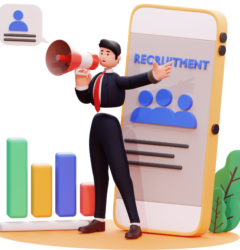
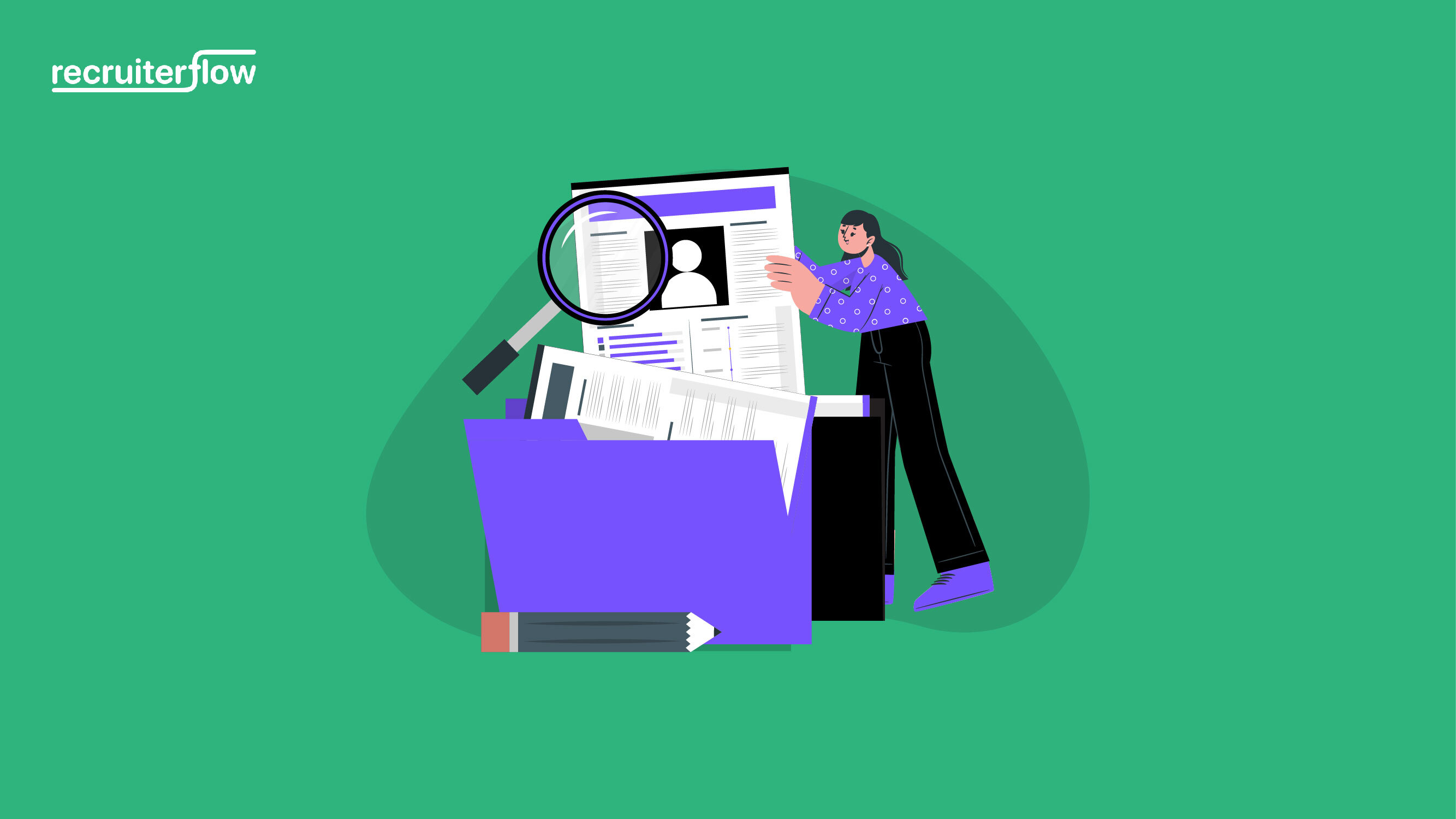
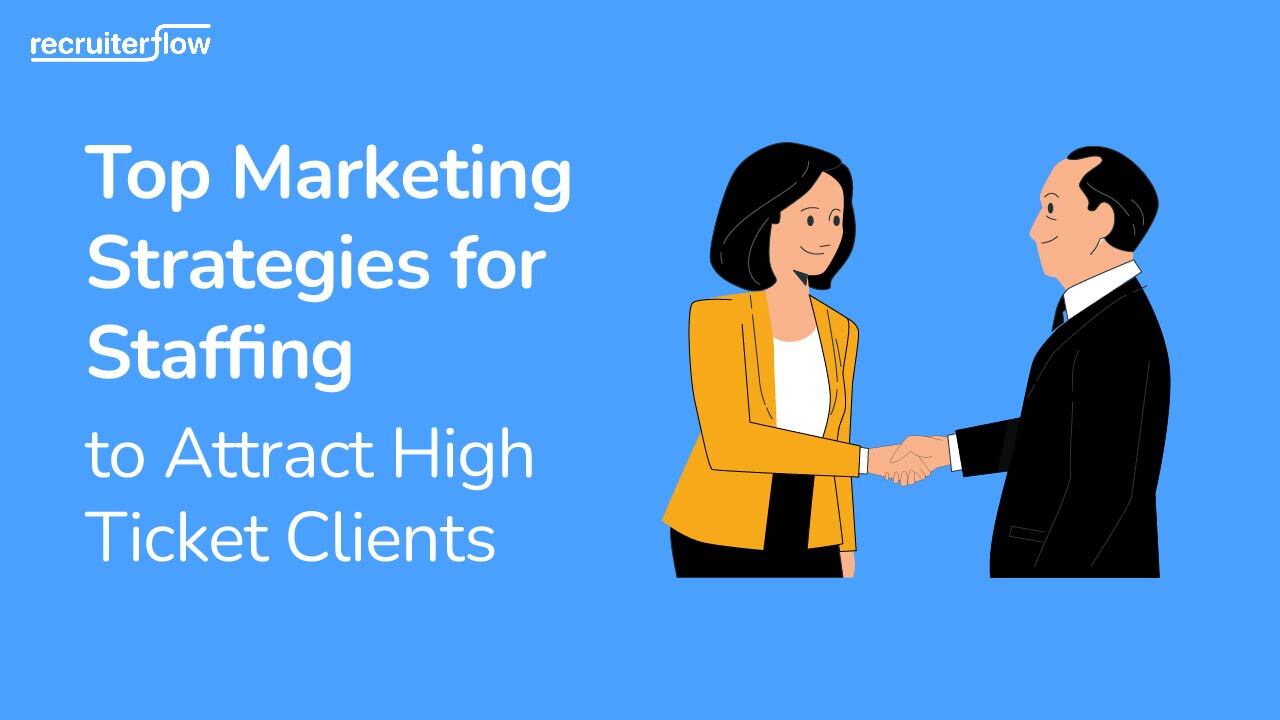
Abhishek Sharma